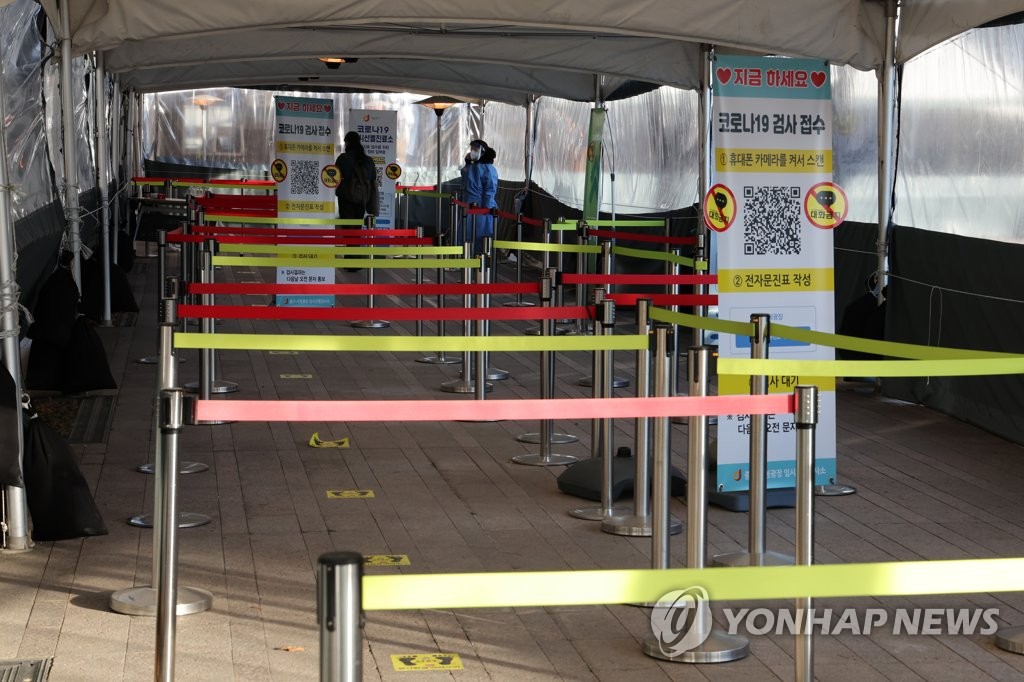- California Assembly OKs highest minimum wage in nation
- S. Korea unveils first graphic cigarette warnings
- US joins with South Korea, Japan in bid to deter North Korea
- LPGA golfer Chun In-gee finally back in action
- S. Korea won’t be top seed in final World Cup qualification round
- US men’s soccer misses 2nd straight Olympics
- US back on track in qualifying with 4-0 win over Guatemala
- High-intensity workout injuries spawn cottage industry
- CDC expands range of Zika mosquitoes into parts of Northeast
- Who knew? ‘The Walking Dead’ is helping families connect
Daily virus cases fall below 4,000 for first time in 3 days amid omicron woes
South Korea’s daily coronavirus cases fell below 4,000 for the first time in three days Friday as the country is speeding up booster vaccination shots amid persistent concerns over the potentially more transmissible omicron variant.
The country added 3,717 new COVID-19 infections, including 3,529 local infections, raising the total caseload to 657,508, according to the Korea Disease Control and Prevention Agency (KDCA).
The figure was down 409 from the previous day’s tally and 1,158 fewer than a week earlier. This also marked the first time in three days that the daily cases have fallen to the 3,000s following 4,443 on Wednesday and 4,125 on Thursday.
South Korea reported 45 more COVID-19 deaths, raising the death toll to 5,932, the KDCA said. The figure was lower than the previous day’s 49 deaths, and the fatality rate was 0.9 percent.
The number of critically ill COVID-19 patients stood at 839, down 43 from the previous day. The figure has stayed below 1,000 for four consecutive days.
As of 6 p.m., the country added 2,410 new COVID-19 cases, down by 116 from the same time the previous day, according to health authorities and city governments. The figure marks a drop by 578 from the tally registered a week ago, and is down by 1,766 from the same time two weeks earlier.
Daily cases are counted until midnight and announced the following morning.
South Korea has been closely monitoring the number of critically ill patients as it has been grappling with possible shortages of hospital beds for treatment.
The coronavirus appears to be spreading at a relatively slow pace recently as the government maintains stricter antivirus measures to keep a lid on a spike in infections after a failed attempt to return to normalcy in phases under the living with COVID-19 scheme early in November.
The government earlier extended temporarily reimposed social distancing rules for two weeks through Jan. 16, which include a four-person cap on private gatherings across the nation and a 9 p.m. business hour curfew on cafes and restaurants.
As part of efforts to fight the pandemic, the government said Friday that it plans to bring in antiviral COVID-19 treatment pills next week, vowing to make sure they will be used as swiftly as possible.
The government has also been making efforts to stem the spread of omicron after the first cases of deaths connected to the variant were reported early this week.
In particular, the country has been accelerating booster shots in the hope that they will help reduce the chance of people developing severe symptoms and enhance people’s defense against the omicron variant.
According to the KDCA, 42.84 million people, or 83.5 percent of the country’s 52 million population, have been fully vaccinated, and 20.05 million, or 39.1 percent, have received booster shots.
Meanwhile, of the 3,529 locally transmitted coronavirus cases reported Friday, Seoul reported 979, while 1,224 came from the surrounding Gyeonggi Province and 172 from Incheon, a port city west of Seoul.
The number of cases from overseas came to 188, raising the total to 18,458.

A coronavirus testing station in Seoul is quiet on the afternoon of Jan. 4, 2022, when the country reported 3,024 new cases, lower than the number from the previous days. (Yonhap)











